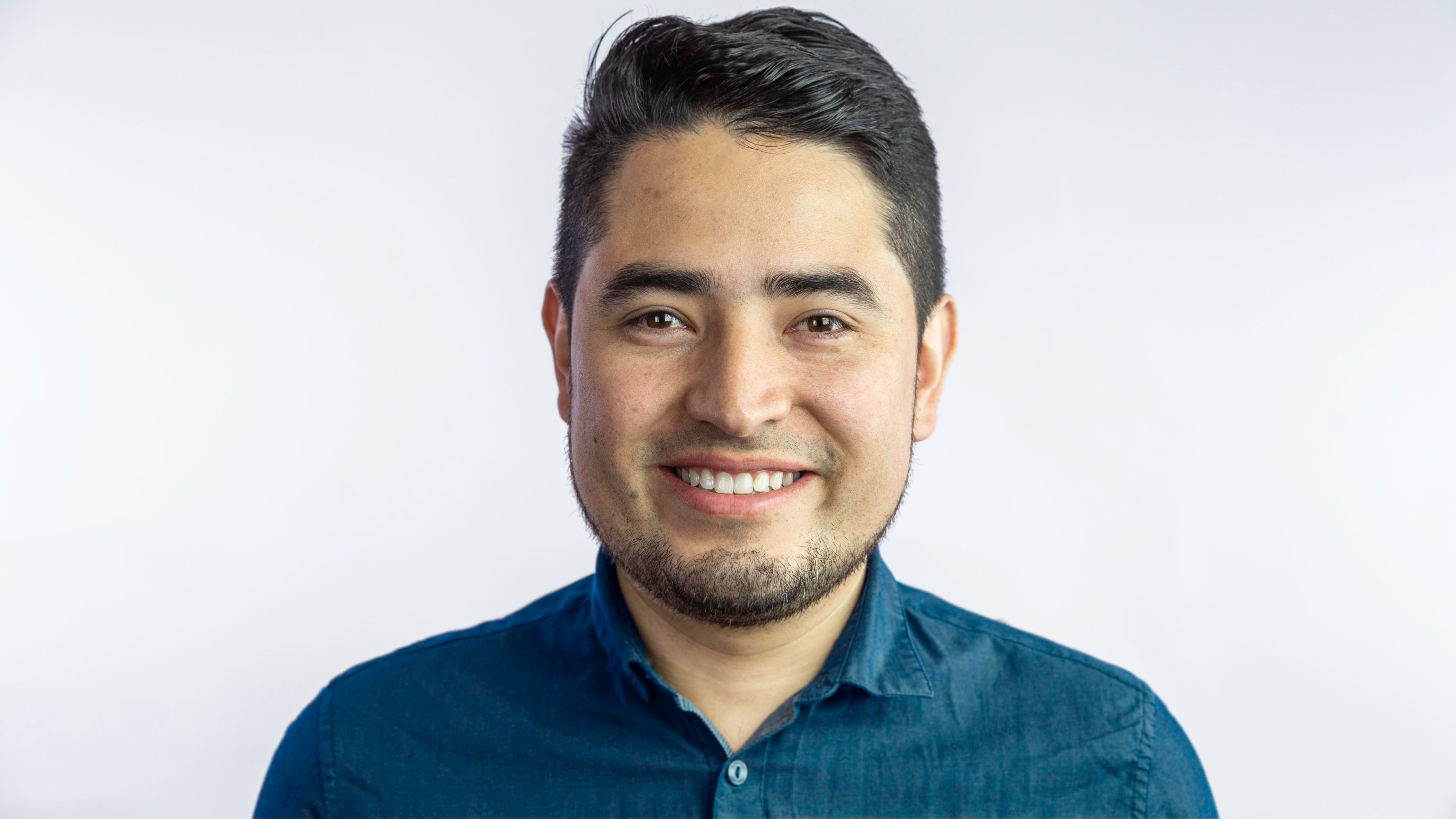
Freddy Vega (35) thinks it's a statistical irregularity. He knows that it is unusual for a child raised in the suburbs of Suba, a popular neighborhood in Bogotá, to learn to code on his own and become two decades later one of the most prominent entrepreneurs of his generation, according to the Massachusetts Institute of Technology (MIT). But he also believes - or knows - that it is not really that irregular. “I see that people who follow similar paths achieve results after all,” he said in an interview with Infobae.
Vega graduated as an engineer and founded Platzi in 2014 with his Guatemalan partner Christian Van Der Hens. In just eight years, the platform became an online education giant in Latin America and Spain, with 3 million students learning what it calls “being technology creators.”
-Each entrepreneur has his own manual of innovation. In your case, how would you define it? What is innovation and how is it achieved?
-There are two types of innovation: iterative and disruptive innovation. Iterative is one that takes an idea that already exists and improves it a little bit. The disruptive is what creates something so radically new that it changes culture, but it comes with a greater implicit risk: the risk of failure. Many innovations have not succeeded. How many times did they try to make a digital currency before a protocol like Bitcoin? Same thing with Uber. There were many taxi applications, but it didn't occur to anyone to build a system from luxury cars to those used every day to change the way we transport ourselves.
One way to understand disruptive innovation is when a product is 10 times better than it used to be. There it is inevitable that people will adopt it. They tried to stop Uber with laws, with protests, but they never succeeded. Disruptive innovation is often associated with scale, reaching millions of people. Normally, this level of scale is obtained through software.
-In general, his gaze is more optimistic than what is usually heard. He often says that Latin America is going to be a global potential.
- I'm convinced. What do you think is the reason why people are pessimistic?
-There are many reasons. At the grassroots level, very high levels of poverty and lack of access to education in much of the region.
-Yeah, that's real. Latin America is a grossly poor place where opportunities for economic mobility basically do not exist. That is the reality. It happens that statistics, as I said, does not apply to the individual. There are paths that lead to the result.
I think it's inevitable that Latin America will succeed. We are a continent with a shared culture across multiple borders. Of course there are differences: you have the barbecue in Argentina, Peruvians have spectacular cuisine, the indigenous heritage of Mexico, the dances, the football. But the similarities are stronger and we have the same time zone. Sometimes we ignore the importance of the time zone being the same. With the explosion of remote work, it doesn't matter what country you live in but what time zone you work in.
- What changes do you see in young people? After all, it is they who can bring the region out of backwardness.
-Contrary to what you imagine, I see more and more young people who are completely inept in technology on a hilarious level. Everyone says they're digital natives. Grab a digital native and ask them to change the wi-fi password to see what they do. They're dying! They throw themselves on the floor and convulse! They don't even know what a file structure is. They think there are no files on cell phones, that there are photos and WhatsApp. The fact that people think that there are no files and only understand the concept of apps is creating alarming digital illiteracy.
-So where does optimism come from?
-Cheapening or, rather, the explosion of connectivity is creating a different generation. A generation that cares less about degrees and diplomas. The reality is that people don't want to be criminals and the code pays better than crime. So when your friends in the neighborhood learn to code and make a thousand dollars a month, three thousand dollars a month or five thousand... it doesn't matter that you've had a terrible life and live in a really screwed up neighborhood, you're going to try to learn technology.
- Is it cheap to study programming taking into account the possible gains?
-Yes. What happens is that in Latin America we are used to the fact that if the possibilities are very good then they are a lie. At Platzi we told them: “Hey, tech startups don't have schedules. You can work whenever you want and they will not measure you by whether you are in front of the computer, but by results, and they will give you free PCs and unlimited vacations. They are going to pay you very well, even in some they will give you shares in the company.” The answer is usually: “It has to be a scam. It can't be. I want a normal job, with a boss who hates me and sees me every day.” It's very complicated because we live in a kind of Stockholm syndrome.
-With all that against it, the success of the region does not seem so inevitable.
-Yes, we have many advantages. Only the region has the same time zone, a common culture and we have a young population. In China people are old, in Europe people are old. We are right at that pivotal point to see if we catch it. It's inevitable because if the job is 10 times better, paid with 10 times more quality and all you have to do is never stop studying at the pace you want... it's inevitable. Little by little the rumor is going to spread and people are going to do it.

- Is the only way out of technology or is there another possible alternative?
- What other alternative is there? Oil? There is a lot of oil, but it is of low quality and after Ukraine humanity is going to be running at maximum speed to stop relying on oil. Coal? Less. There is a remainder of coal, but it is the same story as oil. Industry infrastructure? It would take us many years and dozens of countries have already tried and failed. The metals of all life? Well, yes. They work and will continue to create an extractive industry, but it is not sustainable after all. On the other hand, human talent is a renewable resource.
You don't grow up trying to reach other countries. One has to find the alternative path. Taiwan grew up creating world-class microchip industry. Singapore grew up creating the most important financial system in Asia. Latin America must grow by taking advantage of our only renewable resource, which is the human talent that exists in our nations.
-In other interviews he has said that in Latin America it is frowned upon to be successful, that it is frowned upon to make money. In what aspects do you see that?
-We Latin Americans had complicated experiences and that is why we distrust those who have money. We think they did something wrong and basically that has been real for a long time. What people see is that becoming rich means being a criminal or a corrupt one. Our feeling is that money is bad by default. That is partly related to the fact that Catholicism is the most popular religion here and the Catholic religion exalts poverty. It is one of its foundations.
Today reality marks something else. The vast majority of modern millionaires aren't because they committed crimes. They are rich because they created products: they created Facebook, created SpaceX, created an export and import system. In the next ten years, the largest companies in Latin America will be different from those that exist today. They're all going to have technological innovation. All because they grow exponentially, while traditional companies do so in a percentage way. All top companies are going to have extremely young CEOs, aged 40, 30 or 20, who built the next digital bank, the next digital medicine system, the next digital education model.
A different educational model for an uncertain future
Platzi runs dozens of courses, almost all of which are technology-oriented: programming, data science, web design, digital marketing, writing for the internet, among others. It is paid per subscription and the user has access to all modules. The platform created by Vega tries to break the logic of traditional teaching: there are no times, there are no deadlines for learning. Each user learns at their own pace, from where they want and at the times they want. Official figures support its usefulness: 77% of students looking for work found it in the technology industry and 19% started their own company.
- Can this alternative model be transferred to the formal system, to schools and universities, or is it only possible to apply it in informal education?
-One of the problems of education is the extreme lack of science behind education. Educational science tells us that it is irrelevant to the quality of learning how long it takes you to learn something. It doesn't matter how long it takes you to learn English or program. What makes the difference is not stopping learning. So why do all races last the same? Isn't he a suspect? Why does journalism last as long as nursing, as law, as civil engineering? Why is it structured in semesters? People don't ask these questions.
- Conventions? Uses and customs that date back a long time?
-Yes. A country that no longer exists - Prussia - implemented a cyclical education system to scale up the industrial revolution combined with England, which gave rise to secondary school. But it's 2022! We all accept an implicit contract to exist in humanity: if our children have a bad day in the final exam and fail, they have to take the whole year of school again. We all agree that they lose a year of their lives. And when we are adults, it's the same: if we had a bad day and we took the exam badly, we have to take that subject for another semester.

- And why do you think this system persists?
-The education system is made to employ teachers. How do you pay them? Doing everything very regular. Because if you don't make careers that last the same, isn't the professor of literature worth the same as the professor of medicine? It is due to an industrial format of teacher pay. It is unacceptable to end this machinery for now.
- To what extent do you think platforms like Platzi will compete and relegate to traditional universities?
I think if universities fail, civilization collapses. Knowledge creation depends on them, especially in areas that are not necessarily related to investment returns. The pandemic is on the decline thanks to research into messenger ribonucleic acid, which has been going on for two decades. The basic sciences are those that create human knowledge without being connected to a capitalist objective.
On the sidelines, taking careers that need laboratories and object manipulation, the right way is going to be to study online. Add to that a statistical issue: 88% of the Latin American population never sees a university inside. Going to college mostly means not working full time for 4 or 5 years. How many people can do that? It's an incredibly privileged group. Universities are not going to die, but people who historically had no chance now have one with informal education.
-There is a lot of talk about the professions of the future, that many of the current employees will have to adapt or lose their jobs. What position does a professional have to take in order not to be left out?
-It seems that I'm doing a commercial and that's why people don't believe me (laughs). The only option people have is to never stop learning. We are in a humanity that for the highest paying jobs depends on the ability to transport information between multiple software applications. More than 60 or 70 percent of humanity can't do that. They use one app, but they can't send information to another app. How many people use Excel with a physical calculator on the desktop? They don't know that Excel can make mathematical formulas. The problem is that technological progress is exponential, but the human capacity to adapt is linear.
Then we have to recognize two things. One: the things we learned as young people are not going to help us grow. Two: we have to accept that we will never get to know everything. We're always going to be sailing against the current. There will always be something new. There are people for whom this causes anxiety that blocks them. Other people, like me, are fascinated by it. I don't ever want to be bored. I want to be discovering new things. Learning hurts a lot, it's one of the things that spends calories the most on the brain, but once we start enjoying that pain everything changes.
KEEP READING:
Últimas Noticias
Debanhi Escobar: they secured the motel where she was found lifeless in a cistern
Members of the Specialized Prosecutor's Office in Nuevo León secured the Nueva Castilla Motel as part of the investigations into the case

The oldest person in the world died at the age of 119
Kane Tanaka lived in Japan. She was born six months earlier than George Orwell, the same year that the Wright brothers first flew, and Marie Curie became the first woman to win a Nobel Prize

Macabre find in CDMX: they left a body bagged and tied in a taxi
The body was left in the back seats of the car. It was covered with black bags and tied with industrial tape
The eagles of America will face Manchester City in a duel of legends. Here are the details
The top Mexican football champion will play a match with Pep Guardiola's squad in the Lone Star Cup

Why is it good to bring dogs out to know the world when they are puppies
A so-called protection against the spread of diseases threatens the integral development of dogs




